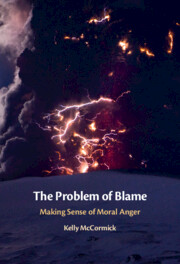Book contents
- The Problem of Blame
- The Problem of Blame
- Copyright page
- Dedication
- Contents
- Acknowledgments
- Introduction
- Part I The Permissibility of Blame
- Part II Prescriptive Preservationism and Eliminativism
- Chapter 5 The Methodological Burdens for Eliminativism
- Chapter 6 Free Will, Responsibility, and Reference
- Chapter 7 Facing the Dark Side
- References
- Index
Chapter 6 - Free Will, Responsibility, and Reference
from Part II - Prescriptive Preservationism and Eliminativism
Published online by Cambridge University Press: 21 April 2022
- The Problem of Blame
- The Problem of Blame
- Copyright page
- Dedication
- Contents
- Acknowledgments
- Introduction
- Part I The Permissibility of Blame
- Part II Prescriptive Preservationism and Eliminativism
- Chapter 5 The Methodological Burdens for Eliminativism
- Chapter 6 Free Will, Responsibility, and Reference
- Chapter 7 Facing the Dark Side
- References
- Index
Summary
Here I attempt to tackle difficult questions about essence and reference head-on by making explicit the way that theories of reference impact the plausibility of existence claims about free will and moral responsibility. Here I restrict my focus to the way that "free will" refers in particular, as this is the only term in the constellation of free will, responsibility, and blame that has thus far received much attention in regard to its operative reference-fixing convention. I begin by canvassing some early work on the way various reference-fixing conventions might inform existence claims about "free will" offered by Mark Heller (1996) and Susan Hurley (2000). I then turn to one of the most systematic attempts to analyze the way that "free will" refers currently on offer, Shaun Nichols’ discretionary view. While Nichols’ account of how "free will" refers is already quite hospitable to eliminativism in allowing that eliminativists’ claims that free will does not exist are sometimes true, I also take up a further argument from Gregg Caruso that Nichols’ view actually suggests that eliminativists’ claims are always true. I argue that Caruso’s argument fails, and that in fact Nichols’ discretionary view offers a path to defend preservationism.
Keywords
- Type
- Chapter
- Information
- The Problem of BlameMaking Sense of Moral Anger, pp. 152 - 191Publisher: Cambridge University PressPrint publication year: 2022

